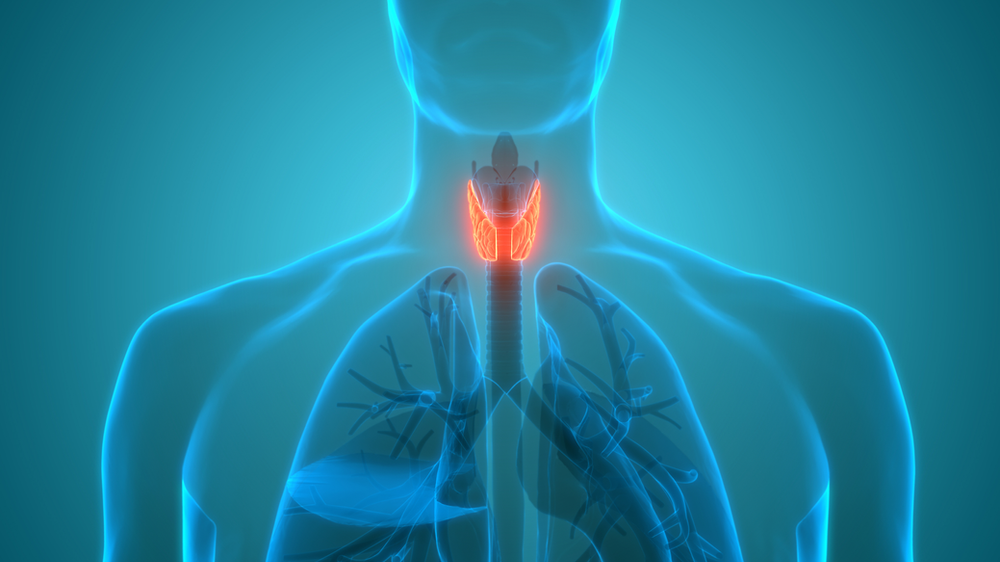Last year we began discussing Conditions AMEs Can Issue (CACI). These are common medical conditions such as Arthritis, Hypertension and Pre-Diabetes for which your AME can issue you a medical certificate if you meet the FAA’s standards. There is a separate worksheet for each of the CACI conditions which the AME can use to determine your eligibility to receive your medical certificate. If your condition meets all the requirements for a CACI and you are otherwise qualified to receive your medical certificate, you can be issued a certificate at the time of the exam.
In today’s CACI Corner we will be discussing hypothyroidism. The thyroid is a butterfly-shaped endocrine gland in the front of the neck, generally situated in front of the thyroid cartilage (Adam’s Apple). The thyroid gland produces and secretes thyroid hormones called T3, and T4 [2]. T3 and T4 are released from the thyroid into the bloodstream where they travel throughout the body to regulate the metabolism, the central nervous system, and the cardiovascular system [2].
Hypothyroidism is a common endocrine disorder in which the thyroid does not secrete enough hormones [2]. Since thyroid hormones regulate the brain, heart, and metabolism, a deficiency will result in fatigue, mental sluggishness, unexplained weight gain, and cold intolerance [3]. If left untreated, this condition can clearly impact the safety of flight. The good news is that hypothyroidism is diagnosed with blood work and treated with oral medications. Once you are on a stable dose of medication your blood work will typically normalize and your symptoms will improve. It is at this point that you are probably ready to see your AME for a CACI.
During the flight physical, your AME will need to review the following information in order to complete the CACI worksheet [1].
Provide a current detailed progress note from your treating physician that is LESS THAN 90 days old.
Be stable on your current medication WITHOUT the need to adjust doses.
Be symptom-free. i.e., no “fatigue, mental status impairment, or symptoms related to pulmonary, cardiac, or visual systems” [1].
Be on an approved medication such as Synthroid.
Have a TSH less than 9.9 uIU/mL or mlU/L within the last year.
Meeting these requirements qualifies you for a CACI for hypothyroidism. If you are unable to prove even one of these requirements, the AME will be forced to defer to the FAA.
The day of the exam is NOT the time to figure out you are not physically qualified. Therefore, we advocate for pre-exam planning. You should bring everything you need to prove your airworthiness to the exam. If you can prove to the AME that you are safe to fly, you will likely get your certificate. If the AME is forced to defer to the FAA, you will already have everything prepared to submit. If you need help, please reach out to us at contact@wingmanmed.com. Getting airmen their certificates and flying are our two favorite things to do.
References:
[1] Guide for Aviation Medical Examiners, 25-Apr-2022. [Online] Available: https://www.faa.gov/about/office_org/headquarters_offices/avs/offices/aam/ame/guide [Accessed: 21-May-2022].
[2] L. S. Costanzo, Physiology, 5th ed. Philadelphia, PA: Saunders Elsevier, 2014.
[3] V. Kumar, A. K. Abbas, and J. C. Aster, Robbins and COTRAN pathologic basis of disease, 9th ed. Philadelphia, PA: Elsevier Saunders, 2015.
Last year we began discussing Conditions AMEs Can Issue (CACI). These are common medical conditions such as Arthritis, Hypertension and Pre-Diabetes for which your AME can issue you a medical certificate if you meet the FAA’s standards. There is a separate worksheet for each of the CACI conditions which the AME can use to determine your eligibility to receive your medical certificate. If your condition meets all the requirements for a CACI and you are otherwise qualified to receive your medical certificate, you can be issued a certificate at the time of the exam.
In today’s CACI Corner we will be discussing hypothyroidism. The thyroid is a butterfly-shaped endocrine gland in the front of the neck, generally situated in front of the thyroid cartilage (Adam’s Apple). The thyroid gland produces and secretes thyroid hormones called T3, and T4 [2]. T3 and T4 are released from the thyroid into the bloodstream where they travel throughout the body to regulate the metabolism, the central nervous system, and the cardiovascular system [2].
Hypothyroidism is a common endocrine disorder in which the thyroid does not secrete enough hormones [2]. Since thyroid hormones regulate the brain, heart, and metabolism, a deficiency will result in fatigue, mental sluggishness, unexplained weight gain, and cold intolerance [3]. If left untreated, this condition can clearly impact the safety of flight. The good news is that hypothyroidism is diagnosed with blood work and treated with oral medications. Once you are on a stable dose of medication your blood work will typically normalize and your symptoms will improve. It is at this point that you are probably ready to see your AME for a CACI.
During the flight physical, your AME will need to review the following information in order to complete the CACI worksheet [1].
Provide a current detailed progress note from your treating physician that is LESS THAN 90 days old.
Be stable on your current medication WITHOUT the need to adjust doses.
Be symptom-free. i.e., no “fatigue, mental status impairment, or symptoms related to pulmonary, cardiac, or visual systems” [1].
Be on an approved medication such as Synthroid.
Have a normal TSH within the last year.
Meeting these requirements qualifies you for a CACI for hypothyroidism. If you are unable to prove even one of these requirements, the AME will be forced to defer to the FAA.
The day of the exam is NOT the time to figure out you are not physically qualified. Therefore, we advocate for pre-exam planning. You should bring everything you need to prove your airworthiness to the exam. If you can prove to the AME that you are safe to fly, you will likely get your certificate. If the AME is forced to defer to the FAA, you will already have everything prepared to submit. If you need help, please reach out to us at contact@wingmanmed.com. Getting airmen their certificates and flying are our two favorite things to do.
References:
[1] Guide for Aviation Medical Examiners, 25-Apr-2022. [Online] Available: https://www.faa.gov/about/office_org/headquarters_offices/avs/offices/aam/ame/guide [Accessed: 21-May-2022].
[2] L. S. Costanzo, Physiology, 5th ed. Philadelphia, PA: Saunders Elsevier, 2014.
[3] V. Kumar, A. K. Abbas, and J. C. Aster, Robbins and COTRAN pathologic basis of disease, 9th ed. Philadelphia, PA: Elsevier Saunders, 2015.





